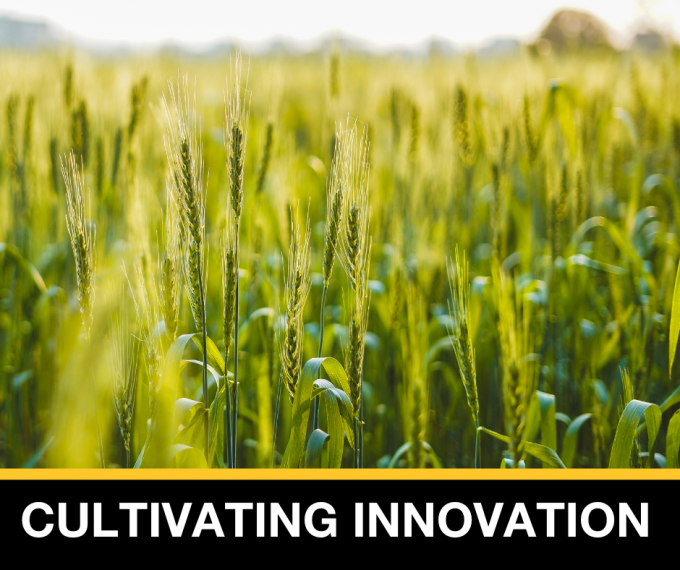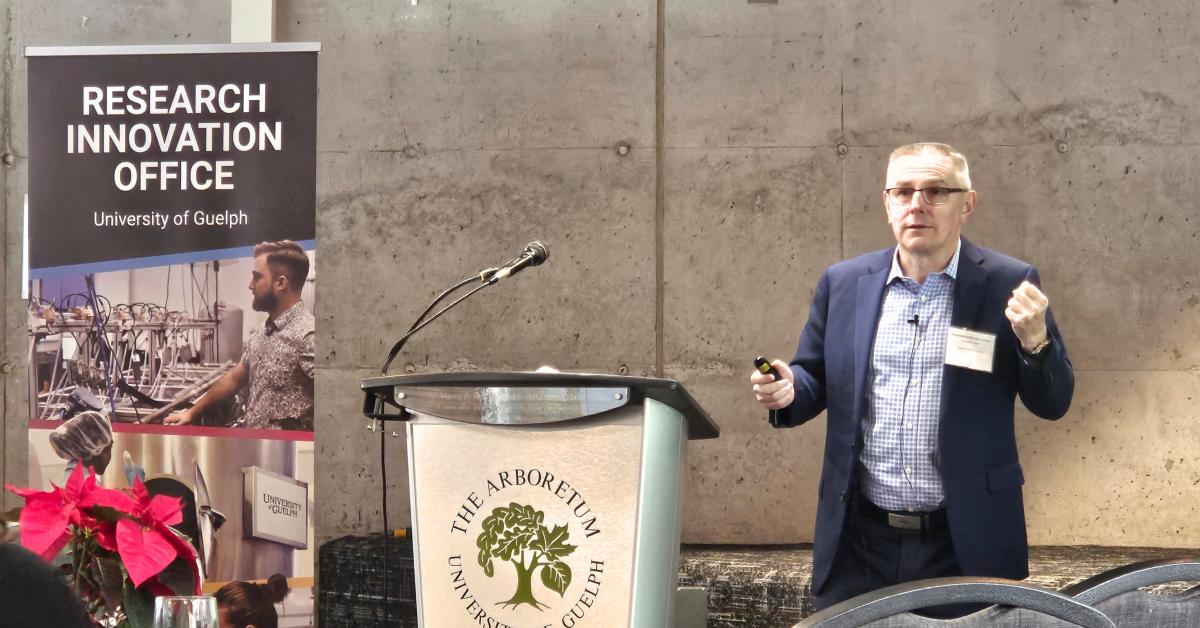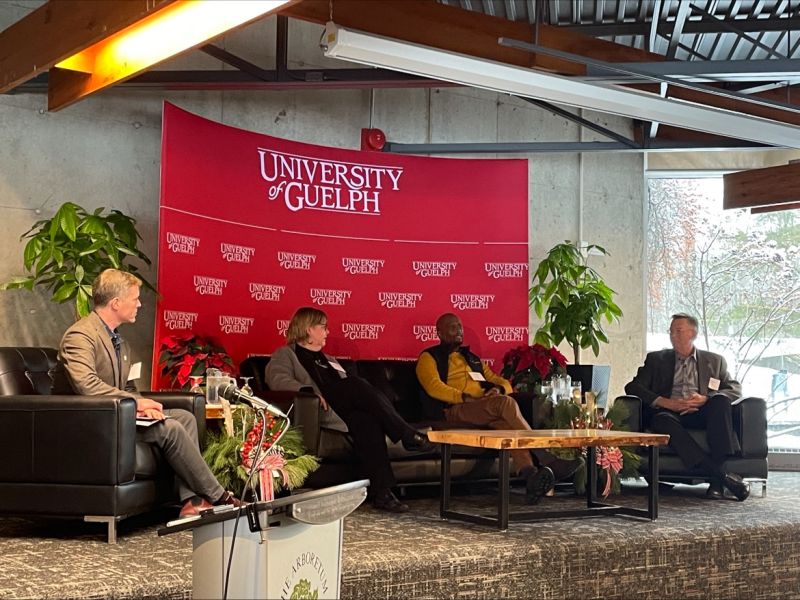Cultivating Innovation: Intellectual Property Strategy for Researchers and Entrepreneurs

Intellectual Property (IP) strategy is a careful and constantly evolving balance between innovative research efforts, commercialization ventures, legal protections, and strategic management. In addition to being a lengthy and time-intensive process, many may not know where to find support for IP strategy development. This desire to connect likeminded IP enthusiasts and novices led to the November 29th, 2023 event “Cultivating Innovation: Intellectual Property Strategy for Researchers and Entrepreneurs” hosted by the University of Guelph’s Research Innovation Office.
“We’re thrilled to host events like this that facilitate knowledge exchange and create a proactive approach to research strategy at the University of Guelph”, said Jessica Bowes, Assistant Vice-President Research of Innovation & Knowledge Mobilization at the Research Innovation Office. “As we explore IP strategy today, I think it is also important to recognize the pivotal role that research plays in catalysing positive change. At the University of Guelph we really see this as an opportunity to underscore our belief in the transformative potential of our research findings. We’ve been doing commercialization and related activities for quite some time. The framework around our commercialization policy serves as a roadmap, guiding the transformation of research findings into tangible outcomes, but also identifying who the key players are within the university community and beyond.”
She continued, “Conversations like this aren’t just good for us here at the University. It is a significant contributor to Ontario’s economic prosperity. IP itself incentivises innovation, protects the rights of creators, and fosters a conducive environment for commercialization, but also the development and dissemination of these new ideas. Effective management and utilization of IP assets contribute significantly to job creation and drives innovation-led growth within the industry.”
A keynote presentation was given by Honorable Justice Michael Crinson, Associate Judge at the Federal Court of Canada. Justice Crinson is a leading expert in contentious intellectual property matters, including patent, copyright, trademark, trade secret, and ownership and inventorship disputes. Sharing tales from his 30-year career in the legal space, he emphasised the importance of learning from failures equally as much as from successes, and in particular, learning from the failures of others and sparing yourself from making similar mistakes.
Leveraging support from peers in industry and institutional resources (such as the Research Innovation Office) is another strategy for success. Justice Crinson encouraged a reframing of the conventional view of competition in the innovation space. Rather than considering innovation as a winner-take-all contest, he recommends cultivating a collaborative network of peers who nurture one another’s’ ideas – while maintaining an appropriate level of IP protection where necessary, of course. “Know who your competitors are and learn from them”, he said. By creating win-win partnerships where everyone benefits from the project, each party is motivated to succeed.
In reference to building a strong team to drive projects forward, Justice Crinson spoke about the value of diverse skillsets and fostering trust in teammates to delegate tasks. With time being a researcher’s most valuable resource, he explained that clearing responsibilities off of the researcher’s schedule and onto more specialized teammates ensures that tasks are managed deftly and swiftly by the person with the appropriate skillset and researchers protect their time for researching. “It’s too much for one person to do all these things. You have facilities in universities called tech transfer offices or innovation offices – use them. They’ve been there before, they can give you a lot of good advice. If you haven’t already spoken to them, speak to them frequently. Use the resources that are offered”.
The second half of the event featured a panel of professionals in the agri-food IP sector: Jennifer Jannuska (Director of Data & Intellectual Property at Protein Industries Canada), Dr. Michael Lohuis (Vice-President of Research & Innovation at Semex Alliance), and Sean Thompson (CEO and Cofounder of Psigryph Inc.). Steve De Brabandere (Director of Technology Transfer & Industry Liaison at the Research Innovation Office) moderated the discussion. Continuing on themes introduced by Justice Crinson, the panelists shared their experiences from different perspectives in the IP world.
Jennifer and the team at Protein Industries Canada work collaboratively with a network of partners to accelerate innovation in the Canadian plant protein sector. Their team takes an “agnostic attitude towards specific IP strategies” and prefers to not favour patents as the gold standard, per se. Instead, attention to detail and deliberate controls built into IP protocols are their priority. Factors such as thorough cybersecurity, detailed employee agreements, noncompete jurisdictions, and physical controls within the facility can all play a role in trade secret protocols, with or without the filing of a patent. There are many pathways to commercialization and many ways that collaborative partnerships can work, but the project management skills are of utmost importance. Jennifer further recommends continuing doing your due diligence even after a patent is approved because others will look for holes in your work.
Semex has been a leader in genetic innovations since 1974, formally amalgamating with two other Canadian companies in 1997 to form Semex Alliance, a cattle genetics and marketing organization. Similar to Jennifer, Michael found that trade secrets make up a large portion of their IP, not only patents. Echoing themes from the keynote, Michael spoke to the value of skilled teammates: “Is it a good use of your time as a researcher to know everything about the patent process? Absolutely not - use experts like the Research Innovation Office as resources.”
Psigryph Inc. is an innovator in the molecular science of cell membrane transport; by increasing the number of molecules delivered into the cells of plants, animals, and humans, this research has massive implications for industries like food and beverages, agriculture, pharmaceuticals, and cannabis. This work has garnered them recognition as one of Canada’s 50 most investable cleantech ventures. Drawing from their own patenting experiences, Sean spoke to the nuances of the filing process including being mindful of which countries to file in as part of your global strategy and protecting from international competitors. Likewise, Sean noted that having an eye on the other international players can keep you attuned to the scientific developments in the field and can help generate ideas for new IP in your own projects.
The conversation sparked by Justice Crinson about collaboration continued in the panel discussions. “Partner for a win-win. Without a win-win, there’s no basis for a collaboration”, said Michael. Sean added “It has to be a win-win. If the other side doesn’t win, I don’t win”. Jennifer remarked that, while her initial impression of the sector when she first began was that it would predominantly be a series of co-invented projects, the reality is an ongoing feedback loop between independent collaborators. The independence helps to manage confidentiality, but the overall collaborative nature of the partnership helps to drive the project forward in equal balance. Reflecting on Psigryph’s history and the recent passing of their cofounder Dr. Gopi Paliyath, Sean commented “You never know what’s going to happen on your journey. You need to have positive relationships for the tough times”.
The clash between IP protection and academia’s culture of “publish or perish” was another topic of discussion. The concept that “publications spoil patents” was shared by the panelists, but they noted that there are successful strategies. Psigryph’s team works intensely with graduate students who publish theses as well as journal articles. They found that proactive approaches to long-term IP strategies have helped them to avoid jeopardizing themselves for future IP, though Sean explained that “it’s a constant battle to know what to disclose and to who, even with agreements in place”.
Events like this are one way to ignite a conversation about IP with an audience from diverse sectors, and this event proved successful in building a deeper network for the University of Guelph within the agri-food sector. We look forward to continuing this momentum in further conversations and future partnerships. Follow us on social media to stay up to date on our work and future opportunities like this, and feel welcome to reach out to our team to have a conversation about how we can help support your work.

Honourable Justice Michael Crinson delivering the keynote address

From left to right: Steve De Brabandere (Research Innovation Office), Jennifer Jannuska (Protein Industries Canada), Sean Thompson (Psigryph Inc.), and Michael Lohuis (Semex Alliance).
About the Speakers:
Honorable Justice Michael Crinson, Associate Judge, Federal Court of Canada
Associate Justice Michael Crinson was born and raised in Stockton-on-Tees in North East England. He attended the University of Dundee, Scotland, where he received a Bachelor of Science degree (with Honours) in Biochemistry in 1988. After a time working in the pharmaceutical industry, he moved to Canada to attend the University of Guelph, where he received a Master of Science degree in Physics in 1991.
He received his LL.B. from Osgoode Hall Law School in 1997, articled with Scott & Aylen, and was called to the Ontario Bar in 1999. While he was also a registered patent and trademark agent, his practice focused on contentious intellectual property (IP) matters, including patent, copyright, trademark, trade secret, and ownership and inventorship disputes.
He has been trial counsel on numerous contentious IP matters in a wide variety of technical areas, including medical devices, forestry equipment, pharmaceuticals, the food industry, electrical engineering, polymer chemistry and biotechnology, particularly genetically modified plant material.
Associate Justice Crinson has contributed to, and actively participated in, community organizations and legal associations, including the International Association for the Protection of Intellectual Property, the Canadian Bar Association, the American Intellectual Property Law Association, the Law Society of Ontario and the Intellectual Property Institute of Canada.
He has received numerous accolades from his clients and peers alike in respected publications, including IAM Patent 1000, The Legal 500, Best Lawyers in Canada and Martindale-Hubbel, which describes him as a "distinguished" practitioner.
Steve De Brabandere, Director, Technology Transfer & Industry Liaison, Research Innovation Office, University of Guelph
Steve has worked with a wide variety of researchers and their IP over the years and has successfully negotiated dozens of license agreements. As Director, he applies his experience in assisting the AVP of Research (Innovation & Knowledge Mobilization) and technology transfer managers to streamline the University's technology transfer process.
Steve has a Master of Biotechnology degree from the University of Toronto and an MBA from the University of Guelph. His background also includes a Bachelor of Science degree in chemistry from the University of Guelph and experience in agricultural production.
Jennifer Jannuska, Director of Data & Intellectual Property, Protein Industries Canada
Jennifer is an experienced lawyer and patent agent qualified in Ontario. Before joining PIC, she spent more than 20 years in private practice, advising clients in diverse sectors on strategic approaches to intellectual property.
A past recipient of Best Lawyers in Canada (Intellectual Property) and IAM Strategy 300 (World's Leading IP Strategist), Jennifer has had the privilege of working with domestic and foreign companies in all stages of IP development, commercialization and enforcement.
Dr. Michael Lohuis, Vice-President Research & Innovation, Semex Alliance
Dr. Lohuis is the Vice-President of Research & Innovation at Semex Alliance in Guelph, Ontario, a leading global dairy and beef breeding company. Semex specializes in genetic, genomic, and reproductive technologies to enhance cattle traits.
Before joining Semex, he worked at Monsanto Company (USA) in animal and plant genomics, statistics, patent science, and environmental modelling. Earlier, Dr. Lohuis was an Assistant Professor in Animal Breeding at the University of Guelph. He holds a Ph.D. in animal breeding and a B.Sc. in animal science from the University of Guelph.
Sean Thompson, CEO & Co-Founder, Psigryph Inc.
Sean is a seasoned executive in drug and business development, advising biopharma companies in BizDev and clinical research. As former VP of Corporate Development at YM BioSciences, he led licensing and M&A transactions, including a major $14.5M deal with Daiichi Sankyo. Sean also managed Clinical Research, contributing to global study successes and $120M in financings.
He held prior roles at GlaxoSmithKline and Roche, and currently serves on several boards and committees, including the Ontario Environment Industry Association and the City of Guelph Economic Development Advisory Committee. He's a mentor with Futurepreneur Canada and holds a B.Sc. from the University of Waterloo.